LEADVILLE • Oscar Wilde stood on this wooden stage 137 years ago wearing silk stockings, velvet coat and profusion of lace while explaining the wonders of art to a packed house of grimy silver miners.
He told the crowd of 888 at Tabor Opera House the tale of Italian master Benvenuto Cellini, a silversmith, but the miners misunderstood the time frame. They asked why Wilde had failed to bring Cellini with him. Easy answer: Cellini died in 1571.
“Who shot him?” a voice shouted from the crowd.
Wilde on a tour across the American continent, was on the brink of international fame. Only 28, he was utterly convinced of his genius. Soon, much of Europe would agree with him.
Today, you can stand on the Tabor Opera House stage where Wilde and escape artist Harry Houdini and composer John Philip Sousa performed and where Leadville dreamers believe stars will perform for many tomorrows. You can see the black leather rocking chair where Wilde rested as he prepared to lecture the miners. You can examine the trap door Houdini installed for his tricks.
In 1882, Wilde described Leadville as “the richest city in the world.” If he was exaggerating, it wasn’t by much. The extraction of silver brought spectacular wealth to a city of 35,000, the same population as Denver. It’s hard to imagine those vast riches today in a city that has dwindled to 2,759.
Leadville might have ranked as wildest city, too. More than 60 saloons/brothels lined State Street, and tough guys roamed downtown. “The revolver is their book of etiquette,” Wilde wrote. “This teaches lessons that are not forgotten.” Every male resident, he said, carried a gun.
Colorado tends to be all about today. Leadville shines as a precious destination to explore and ponder the past. The city is battling to save its Opera House, only lightly altered from the night of April 13, 1882, when Wilde talked from the big stage. Most of the auditorium seats are original.
After his lecture, Wilde strolled across the street to a “dancing saloon” and saw a notice posted over the piano. It’s the most famous sign in saloon history.
“PLEASE DO NOT SHOOT THE PIANIST,” the notice read. “HE IS DOING HIS BEST.” The dancing saloon, the Silver Dollar, remains open for drinks.
Stephanie Spong has lived in Manhattan, Los Angeles, Tokyo and Hong Kong.
“But I never knew community until I came to Leadville,” she says. “It’s a deeply, closely knit little community, and it’s like any small town. It’s quirky and ornery.”
She’s part of the crusade to restore the Tabor Opera House to its former splendor. It won’t be easy. Walls must be stabilized, heater and exterior elevator installed, a movie projector purchased and on and on. The price tag for rehabilitation is approximately $10 million, Spong says.
“I’m fighting for this because Leadville has no movie theater, no community center,” Spong says. “Leadville has no place where a tightly knit community can go to be a community together.”
In Colorado’s early days, a city’s opera house served as its claim to culture, and a few remain. The Rourke Opera House in La Junta was converted to the Fox movie theater, which shows films on two screens. Trinidad’s sprawling and opulent West Opera House, with two balconies, sits empty awaiting revival.
After touring America, Wilde returned to England to become, for a decade, a glittering celebrity. He wrote hit plays and permanently readable fiction, including “The Picture of Dorian Gray.”
On April 16, three days after winning over the miners, Wilde arrived in Colorado Springs to speak at the opera house on 18 N. Tejon St., where The Gazette offices now stand.
“His appearance was rather commanding,” The Gazette reported in its April 17, 1882 edition.
Rather commanding?
Wilde was decked out, The Gazette reported, in “black velvet dress coat, knee breeches, silk stockings and low shoes with sparkling steel buckles … his left hand was clothed in a white glove while in his right he carelessly held its mate.”
For much of the tour, American crowds flocked to see Wilde, but not in the Springs. “The audience … ” The Gazette reported, “was not a very large one.”
Wilde spent nine months in America, traveling from New York to San Francisco, but his night in Leadville glows as the most famous of his 126 American lectures. He was lowered, in a big bucket, into the heart of Horace Tabor’s gloriously profitable Matchless Mine. In the darkness, he enthusiastically downed three rounds of whiskey with the miners.
“They were polished and refined compared to the people I met in larger cities in the East,” Wilde wrote.
During his visit, Leadville reigned as epicenter of Colorado’s thriving mining industry. The city never would shine so brightly again.
Wilde’s glory didn’t linger, either. He was sentenced to prison for, in essence, being gay. On May 25, 1895, he started two years of hard labor at London’s Pentonville Prison.
He never recovered from the shame and stress. He died, only 46, of meningitis in 1900. A battered horse-drawn hearse bearing the number 13 carried his cheap coffin to a Paris grave.
Better to remember him at his peak, when everything seemed possible, when he stood laughing before miners in all his brilliance and all his outlandish attire on this stage in the center of Colorado.
If you go:
Tabor Opera House, 308 Harrison Ave., Leadville. Taboroperahouse.net
Tours scheduled through October every day but Monday on the half hour from 10 a.m. to 5 p.m.
Admission: $10.
Also, cowboy singer Michael Martin Murphey performs at the Opera House Aug. 23 and Denver blues/jazz star Hazel Miller performs Aug. 31.


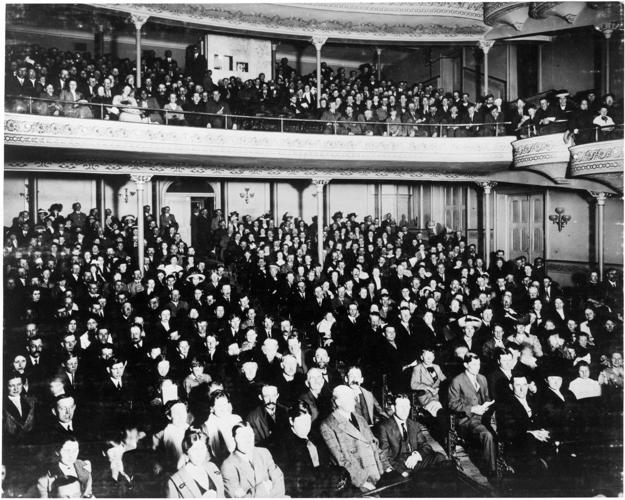
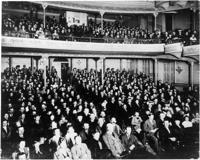
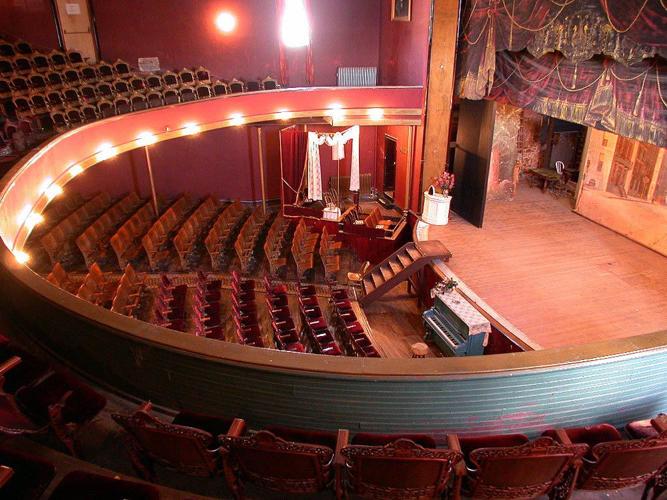
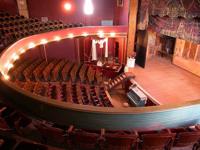

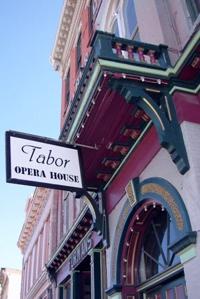

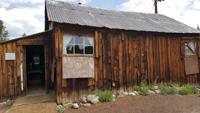

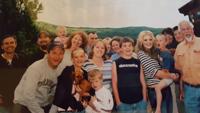

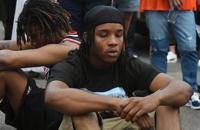
 Your Privacy Choices
Your Privacy Choices